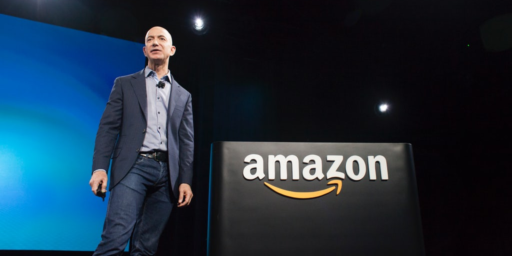Are Book Publishers Useless?
Have digital books rendered the publishing houses obsolete?
Matthew Yglesias argues that “Amazon is doing the world a favor by crushing book publishers.” His essay is a response to the “Is Amazon a monopoly?” debate triggered by New Republic editor Franklin Foer and rests on the premise that publishers add “almost no value.” He has three supporting arguments:
1. The industry is “dominated by a Big Four of publishers, who are themselves subsidiaries of much larger conglomerates” and therefore well able to compete with the likes of Amazon.
2. The rise of the e-book has taken away the primary value that was once added by publishers, namely “Transforming the manuscript into a book and then arranging for it to be shipped in appropriate quantities to physical stores around the country.”
3. Publisher are bad at marketing books, which sell mostly on the strength of the efforts of the authors themselves.
Matt is himself a published author and the son and grandson of very successful novelists, so he’s not without experience. And he’s at least partly right on all three points. But he nonetheless misses key functions performed by publishers.
First, they’re gatekeepers. While there are countless stories of highly successful authors whose work saw the light of day only after having been rejected by numerous publishers, the fact of the matter is that the vast number of books written are dreadfully bad. The fact that a Random House or a Yale University Press has seen fit to devote its resources to putting out a book provides a strong signal that it’s worthy of being read.
Granted, this is less important than it once was, in that authors can become minor brands into themselves via social media and other forms of micropublishing even before putting out their first book. Indeed, Yglesias himself did that. Absent his blogging-built reputation, there was no way Wiley would have signed a 20-something kid with a philosophy degree and no foreign policy experience to write a critique of how the America’s political parties conduct foreign policy. Even so, most authors still rely on being published by a publishing house to build their reputations.
Second, they provide editors. As a former editor myself, including briefly at a minor publishing house, I admit my biases here. But all but the most gifted and experienced writers benefit tremendously by collaborating with an editor who serves as a sounding board and sanity check as well as a copyeditor who helps turn the manuscript into a cleaner copy.
Third, providing advances is much more important than Yglesias thinks. It’s true that publishers do this as an investment rather than out of altruism. But most authors take a long time to produce their masterpieces and rely on the publisher advance to sustain themselves while they research and write them.







I have read a couple of e-books when I’ve said, “Wow, this person defintely needed an editor / publisher”. It gave me a sudden feeling of gratitude.
But e-books are here to stay. People will have to market themselves, or a new type of service will become viable to promote self-published books.
I agree with all your points James. His #2 is simply dead wrong – the E-Book is created from the same electronic manuscript as the print version. And yes, editors are very important. I do book reviews and the publishers send me advanced notice and free review copies.
@John Peabody: If the E-Book was poorly edited the print version was too. Now in the case where people are self publishing E-Books that can be a problem.
@John Peabody:
Well, there are a lot of people who I’ve noticed are trying to freelance themselves as editors and proofreaders. Perhaps people who self-publish need to look into that.
@John Peabody: Agreed, a good parallel is the self-representing lawyer with a fool for a client.
@Ron: Oh, this was most definitely a book self-published as an e-book. No one else would allow for the same explanatory sentence to appear at least six times across several chapters.
@Doug- That’s the ticket!
@Tony- Very good.
I suspect in Yglesias’s head, not speaking for him of course, he envisions the “new publishing regime” –minus the Big Four and their method of operation– still retaining the gate-keeping, the editing, but possibly not the advance. (Although that could be structured in different ways. A lot of media stuff these days is presold.)
The problem isn’t how the industry is structured so much as it is how the publishers operate. Their tendency to indulge trends leaves some markets underserved and, sometimes, destroys them completely. From a reader perspective, I wouldn’t mind if some writers took a year or two off rather than pumped out this year’s hardcover just in time for Christmas. We get retreads and knockoffs and they’re all slickly packaged, priced more than they’re worth. Who wrote the latest Ludlum novel? Who cares?
Meanwhile, half of them are so wrapped up in their cultural mission that they’re pumping out unreadable magnum opi edited by fawning sycophants who won’t cut a word…or insist on proper punctuation or spelling. It’s “art,” you see, and so it must confound and annoy you.
There’s more:
* They can’t sell a short story. Seriously, the most readable format in the history of literature and the publishers have never been able to figure out how to sell it. Or the novella. Second most readable format in the history of literature! Publishers are at a loss as what to do with them. “Put it in a collection,” is where it starts and stops with them.
* They have the same “distribution window” problem the movie business has. First the hardcover, then the paperback, hopefully some Hollywood money, then the reprint. Anything not going through this distribution window is automatically considered second tier, which makes it less valuable. This way of doing things made sense once upon a time, but it’s a relic of a bygone age.
* They charge too much. Sometimes it seems that book publishers think they’re just competing amongst themselves. The modern audience is a multi-media audience and not a dumb one either. They can puke out a new Call of Duty just as fast as they can a new James Patterson novel, and really….it’s no contest.
I’m sure I can think of more, but that’ll do for now. Me, I’m coming at this as a reader. I feel poorly served by the publishers and optimistic that any shake-up in the industry will be good for the reader.
And long run, if it’s good for the reader, it will be good for the publisher.
Third, providing advances is much more important than Yglesias thinks.
Shocking that Yglesias doesn’t appreciate the importance of being able to pay one’s bills.
Mike
1) True that publishing is backward.
2) True that most have no idea how to reach the retail buyer.
3) False that we no longer need publishers. We need editing, covers and advances.
4) No pity for people who whine that they couldn’t get published: waaaah. Most likely your book sucked, or you gave up too easily. Work harder.
An actual published book–by Random House, Doubleday, Little Brown, say–gets reviews because it has an imprimatur of legitimacy. Someone thought well enough of it to pay an advance for it. Self-published books? They get ignored. By everyone.
You hear occasionally that some self-published e-book (or pint version from Create Space) becomes a success, but that’s extraordinarily rare. The vast majority of them fall into a black hole.
Traditional book publishing is not, however, without many problems. The rush to publish celebrity memoirs is a case in point. Andrew Cuomo’s has bombed badly. With the $700,000 Harper paid Cuomo as an advance, they could have paid $35,000 advances to 20 authors for books someone might have actually wanted to read.
Not sure I see the problem. Other than publishers are no longer the “gatekeepers” with the power to keep out the dregs, they should be able to continue along as they’ve always had. Unless, of course, the lament is that there is now a new thru-way that others can take to the reading public. Now, everyone can basically dumpster dive the publishing house to see what they passed on. Lots of dreck but occasionally a gem.
But still, while publishers can no longer keep “out of print” writing they don’t approve of, surely they could indicate their “seal of approval” on works they select, provide a stable of editors, and supply advances. Would that not be of value?
But really, like news papers, someone should look to see what publishers are actually selling. With the media, it turned out they were being supported by monopolizing advertising, especially classified ads. Where to publishers actually get their money? Has that product been usurped? I suspect we’d find the cash cows are in romance novels, low rent mysteries, etc. Not in the “reputation” stuff where they fund their friends “great American novel” or political treatise. And, the low rent authors have no problem using the new thru-way to the readers. They develop followings and independent reputations. Often their readers will forgive a bit of poor grammar or formatting.
Can publishers survive if the low-rent material has a new way to market, leaving them with the high-rent, highbrow to support them?
@michael reynolds:
I interested in your perspective as to why advances are required.
Speaking as part-owner of a small (yes, very small) publishing company, I see our role mainly as working against Sturgeons Law (“90% of everything is crap”). Editing, proofreading, and design. Editing is the most important–being able to wade through a tray of sludge and realizing that there’s a nice little witty comedy buried under all of that, but a) the author doesn’t realize it or b) doesn’t have the guts to “kill his darlings.” Sometimes the editor has the cunning to realize that a book told in the third person would be much better told in the first. The lure of advances and the possibility of publication is what gives the editor the clout to nag the author into improvement. Now, with the event of self-publication, if the author REALLY hates anyone mucking around with his version of Teh Great American Novel he can flounce off and self-publish through Amazon. Where chances are, it will sink into oblivion like a rock.
So the would-be authors that can take criticism will remain submitting to publishing companies, and those that can’t will end up in the self-publishing. At least now with e-publishing we don’t get the vanity presses ripping off people quite so much any more. So that’s good.
We’ve done some e-publishing, but also do some print-on-demand stuff. What has become harder and harder to do (thanks to Amazon and all the others demanding 55% discount wholesale prices) is to justify the publication of actual, Smythe-bound books. Ah well, c’est la vie.
So when the next book you buy disintegrates into a handful of pages into your hands because of the cheap paper and disintegrating glued back, lift a glass to Amazon.
I have tried digital and our state system actually has some top sellers available. But I still like the in hand books. The way they feel and the way some smell.
@Guarneri:
The case for advances in non-fiction is easy and clear-cut. Guy has an idea for a book, but it’ll take three years of research and 20k in travel, let’s say. He’s a grad student or an assistant professor and flat can’t do the book without advance money. Eliminate advances and you basically eliminate non-fiction.
When it comes to fiction it’s not as clear-cut. In fact I’ve been tempted to go self-pub and take the 70% split. (Although once Amazon destroys publishing it won’t be a 70/30split any more.)
Generally though, writers are not entrepreneurs. I am, but I’m an outlier. Most writers are doing a day job when they start out. They put in 40 hours a week teaching or waiting tables or whatever, which drastically limits how much they write. Again, there are outliers who can do both, but take my word for it, having to hold down a day job eliminates a vast proportion of writers.
Writing is a strange gig, not comparable to most jobs. You don’t have an office, you don’t have a boss, there is no fixed work day, so there is no external discipline. It’s not digging ditches, and honestly I think I have the best job on earth, but it starts with people needing to get the free time, needing to impose discipline on themselves, getting their minds to an altered state where they experience unreal things, and doing it while a voice in your head keeps reminding you that it’s almost certainly all for naught because you’re never going to get paid. Very few workers can work well without getting paid. Imagine going into your office and busting your ass every day for six months knowing there’s a 95% chance you’ll be paid nothing, ever. Imagine quitting your job in order to chase that 5% possibility.
So, in terms of getting writers to actually write, the advance serves the function of a paycheck – it buys you time to work, it obligates you to show up, and it gives you some confidence that you’re not just wasting your time. The advance is the external discipline that other workers get from a paycheck.
The problem with the Amazon-only approach is that it will reward the hustler or the facile hack over the artist. Just learned the other day that while Hemingway and Fitzgerald were writing they were vastly outsold by Zane Grey and Edgar Rice Burroughs. I have nothing against Burroughs or Grey, (aside from the fact that Burroughs was a rabid racist and involved in the eugenics movement) but neither was much of a writer. Hemingway and Fitzgerald made major contributions to writing and to civilization – and incidentally ended up creating the more valuable intellectual property. But they both lived off advances.
If Amazon destroys publishing it obliterates non-fiction and it severely cuts fiction output while lowering quality. This has major downstream effects in movies, TV, gaming and education. You also end up with Jeff Bezos deciding what opinions he wants to see expressed, and what he wants to cut off at the knees – as he’s already done. None of this is good for civilization, or the market, it’s only good for Bezos.
@Tyrell:
I’ve been surprised by the persistence of the dead-tree book, even among kids.
@michael reynolds:
I don’t disagree with any of what you said, but to be fair, the days when editors and publishers would nurture a talent are long gone. There aren’t any Malcolm Cowleys any longer.
Back in 1992, my agent reported to me, with considerable unhappiness, that more and more editors were saying, “Don’t come to me with anything but a celebrity book.” Other agents, acquaintances of mine, confirmed this. It’s called, nowadays, “having a platform.”
Ivana Trump put her name on a novel that a ghostwriter was paid one million dollars to write. One million dollars. A similar situation occurred with Pamela Anderson, whose contribution to the “novel” she wrote was to pose nude on satin sheets for the cover.
I don’t know how this situation gets changed for the better.
@CSK:
I agree, it’s not a talent-nurturing business and you’re only as good as your last book.
Quick story. My wife and I used to write together under her name and some pseudonyms. We had a major hit with a middle grade series called ANIMORPHS which went to 63 books and sold something like 30 million units. More or less simultaneously we had two other series running that did okay, not great. Then we quit for like 4 years.
When we decide to go back to work, Katherine could not get an agent. 30 million books, and couldn’t find an agent. That was seven years ago. Last year she won the Newbery and her book sat on the NYT list for 80 plus weeks.
It’s cold out there.
@Doug Mataconis: I edit books for people I know, which may seem amazing for those who often read my comments here. I do take more time and usually don’t charge anything.
Wait, Jeff Bezos is going to buy the internet? All the blog platforms? All the raw HTML? And all the future text delivery systems that might be invented.
Much worse than with just a few publishing houses based in the same city and who socialize with each other? Who have the power to directly impact what is on the small independent bookseller’s shelves as well as what the big ones find of interest?
@michael reynolds: I have nothing against Burroughs or Grey, (aside from the fact that Burroughs was a rabid racist and involved in the eugenics movement) but neither was much of a writer. Hemingway and Fitzgerald made major contributions to writing and to civilization – and incidentally ended up creating the more valuable intellectual property.
I’m not silly enough to argue for Grey or Burroughs over Hemingway and Fitzgerald as writers, but I wonder if Tarzan by itself isn’t a more valuable intellectual property than what those two gentlemen put to paper.
Mike
@JKB:
The NYC publishers compete. Amazon has no competition.
(Incidentally, the Big Four publishers are 1) CBS, 2) NewsCorp as in Fox News Channel, 3) Bertelsmann a privately-held German corporation, and 4) Hachette, a French corporation.)
And you do realize that Wait, Jeff Bezos is going to buy the internet? is not a response to, You also end up with Jeff Bezos deciding what opinions he wants to see expressed, right? I didn’t say Bezos would bar you from expressing an opinion, he would just be able to bar you from expressing an opinion in a book store (his) that totally dominates book sales. That’s not arguable, obviously, since he’s already doing it.
Of course once you’ve accepted that Roger Ailes should be able to make up all the “news” you consume I suppose it’s a pretty short jump to accepting that Jeff Bezos should decide what books you can read.
@MBunge:
Tarzan was big in the 20’s and 30’s with dozens of movies, but that franchise is pretty much dead now, and the books no longer sell, while pretty much every high school kid has read Hemingway and Fitzgerald and they spawned some movies as well.
By the way, I should credit my source: Bill Bryson’s One Summer – America 1927. Neat book. Apparently Upton Sinclair outsold them all but still contrived to end up a broke-ass alcoholic.
I think I can top your story about Katherine, Michael. My agent once got a rejection for one of my books that said: “This book is too well-written to be commercially viable.”
It was published. (Not by the people who considered it too well-written, I should add.)
I swear this is true. In a funny way, I even understand what the editor meant.
@michael reynolds:
Shit, Sinclair Lewis, not Upton Sinclair. Damn it, I keep doing that.
@CSK:
Yes, surprisingly (ahem) well-written is not synonymous with “commercially viable.” Not naming any names coughStephanieMeyercough.
@michael reynolds:
They’ve become (cough) legion (cough).
@michael reynolds:
Usually, yes. But.
One of my favorite books happened this way:
1. Author wrote the book that she couldn’t not write
2. Publisher’s rep loved it, but was not permitted by Publisher to buy any new author SF except for series tie-ins.
3. Author wrote a series tie-in she didn’t want to write, to get around the rule. Publisher’s rep bought the tie-in.
4. Publisher’s rep then bought the real book.
That’s just crazy.
On the flip side, anyone who has ever read slush(*) knows just how great a service publishers provide. The trick is to find a system that doesn’t hold the shake down and strangle the creative talent, while at the same time providing the traditional value added (advances, editing, publicity) of publishers.
(*)”Slush” is what publishers call unsolicited manuscripts. The average quality is negative, and the stack is very very deep. Wading through that quagmire and finding the pearls is what justifies publishing houses.
@michael reynolds: Tarzan was big in the 20’s and 30’s with dozens of movies, but that franchise is pretty much dead now, and the books no longer sell, while pretty much every high school kid has read Hemingway and Fitzgerald and they spawned some movies as well.
Since 1966, there have been at least 8 cartoon or live action Tarzan TV shows, the 1999 animated Tarzan movie was the 6th biggest box office hit of the year and is 162 in all time worldwide box office, without adjusting for inflation. The 2013 Great Gatsby is, non-inflation adjusted, 255 all time worldwide. That ’99 Tarzan also spawned a TV cartoon and a direct-to-home video release. And there’s a new Tarzan flick due out in 2016. And a quick google search turned up a NYT book review article that mentioned between 30 and 60 million Tarzan books were sold during Burroughs’ lifetime so while Hem and Fitz have certainly outstripped those numbers now, they’ve had about 50 years to do it and the total sales of Tarzan books might still be in the same county, if not the same neighborhood. Now throw in the inflation adjusted box office of all those Tarzan films when the character was legitimately one of the biggest figures in popular culture for at least a decade or two.
If the question is who has generated the most economic value, I suspect Tarzan still has the lead.
And how many of those high school kids read Hemmingway or Fitzgerald by choice?
Mike
How many actually read them at all? The sales might be up due to them being assigned, but that doesn’t mean they are read. Unless read in class.
@michael reynolds:
Really? No competition? I bought some stuff at an Amazon competitor today. And most of the books I’ve read of late have come from the Internet Archive or other out-of-copyright collection online.
I find it odd that you think Amazon is the only bookstore or almost so. Reports here is that books must be listed on Amazon to find the big audience. Well, Amazon provides a good merchandising experience. Perhaps some other company will choose to sell books and do merchandising better.
Does Amazon prohibit authors/publishers from providing their product to other vendors? Doesn’t look like it.
Also, why all this assumption that I even see Fox News. The only time I see Fox News is when someone links to it in a blog, a lot of the time here or the Daily show does a riff off of it. I would observe though, that many here seem to be awful familiar with Fox News content.
@MBunge: How many of them have READ Tarzan (by choice or otherwise) compared to the number who have watched a movie.? I know only one person who may have ever read anything by Edgar Rice Burroughs, but he’s the type of guy who will read anything–he has a 100 books at half-price credit currently at his local used book store (not including the credit his wife has on her hundreds of Harlequin Romance novels).
Well, there you go. Publishers perform a valuable service and will prosper for it.
On the other hand, they no longer have a monopoly on who can get their product to the consumer. A monopoly that left the consumer worse off by not having the choice of what to read because the author couldn’t get past the “gatekeeper”. A monopoly that specifically took over to stop trade paperback competition with hard covers. A monopoly that sought to set prices for consumers for the monopoly’s benefit.
What I don’t understand is all the hand-wringing over authors no longer being blocked by publishers. All that has really happened is that the “slush” is now available for anyone who might feel like reading.
@JKB:
No, you still don’t get it. If you had to wade through the slush to find things to read, you would stop reading. This is not a service that people can provide for themselves, or that unlimited access to everyone’s writing will fix. It’s not even like music, where you can listen to a few tunes and decide who you like or don’t like with very little time commitment. (And, as much as I loathe record companies, I have to admit that the Beatles would never have been the Beatles without George Martin and EMI.)
First I love my kindle. I admit I like the look and feel of paper books but I like the fact that for much of my pure pleasure reading I don’t have to find a place to store the paper book nice (before my kindle and still I have shelves crammed with books all over my house).
I believe self publishing is here to stay and that ebooks and self publishing isn’t going to put the big publishing houses out of business but it might change how they do business.
I’ve read a lot of self published work-partly because I like genres that are often hard to break into in the big house publishing world (eg if you right straight historical fiction or especially fantasy or Sci Fi the gatekeepers may not sign you because they don’t want to sign more writers in that genre at that time not because your writing or story is bad).
I think it is important for self published authors to still use an editor-editing is important and it isn’t just about spelling and grammar. Self published authors shouldn’t self edit ever.
I know some authors prefer self publishing-I have a friend who writes fantasy and was published by one of the publishing houses. A few years ago she began self publishing because she made more money even though she sold her books for less in ebook form (she also had paper books but they were slightly more per book for purchase). However she did still use an editor.
I have also noticed small ebook oriented publishers springing up usually for authors who write in areas where it’s difficult to get published by larger houses.
@Just ‘nutha’ ig’rant cracker: many of them have READ Tarzan (by choice or otherwise) compared to the number who have watched a movie
People are still reading Tarzan and John Carter, though I can’t imagine it’s anywhere close to the number reading Hemmingway and Fitzgerald. But the question is about valuable intellectual properties and I didn’t even get into things like comic books, newspaper strips and a multitude of Tarzan collectibles. And if you want to get macroeconomical, there’s the whole sub-genre of “white jungle hero” in adventure fiction that used to be pretty popular in an era of SLIGHTLY different racial attitudes. All of that, and any economic value it had, flows from the intellectual property of Tarzan.
Mike
@michael reynolds:
Happened to them all the time. Fortunately they liked one other for most of their lives and were amused and flattered by the mistake. Personally, I mentally call them ‘Upton Sinclair Lewis’ until I remember which one I’m talking about.
Clearly the publishing industry is going to change in response to the rise of ebooks and the ease of self-publishing. But the need for publishers, and especially editors, isn’t going to go away any time soon. I’ve read a few self-published works and thought “I think there’s a decent story hidden there. Too bad they didn’t have an editor to help them find it.”
While self-published writers can turn to freelance editors, I wonder if the freelance will be able to provide the same sort of support and direction an editor from a publishing house can. Will they be pointing out ways to reframe the story when necessary? Trim parts, focus on others, change the emphasis? Or will they cut out the repetitive sentences, sharpen the language and make sure there are no obvious typos? Will it be worth it to them to put in the extra work to turn an okay book into a gem?
I don’t know the answer, but I would be interested to know how the services compare.